【期末备考】人教版七下英语期末基础知识梳理(Unit 1—Unit 6)(标注重难点)
文档属性
| 名称 | 【期末备考】人教版七下英语期末基础知识梳理(Unit 1—Unit 6)(标注重难点) | 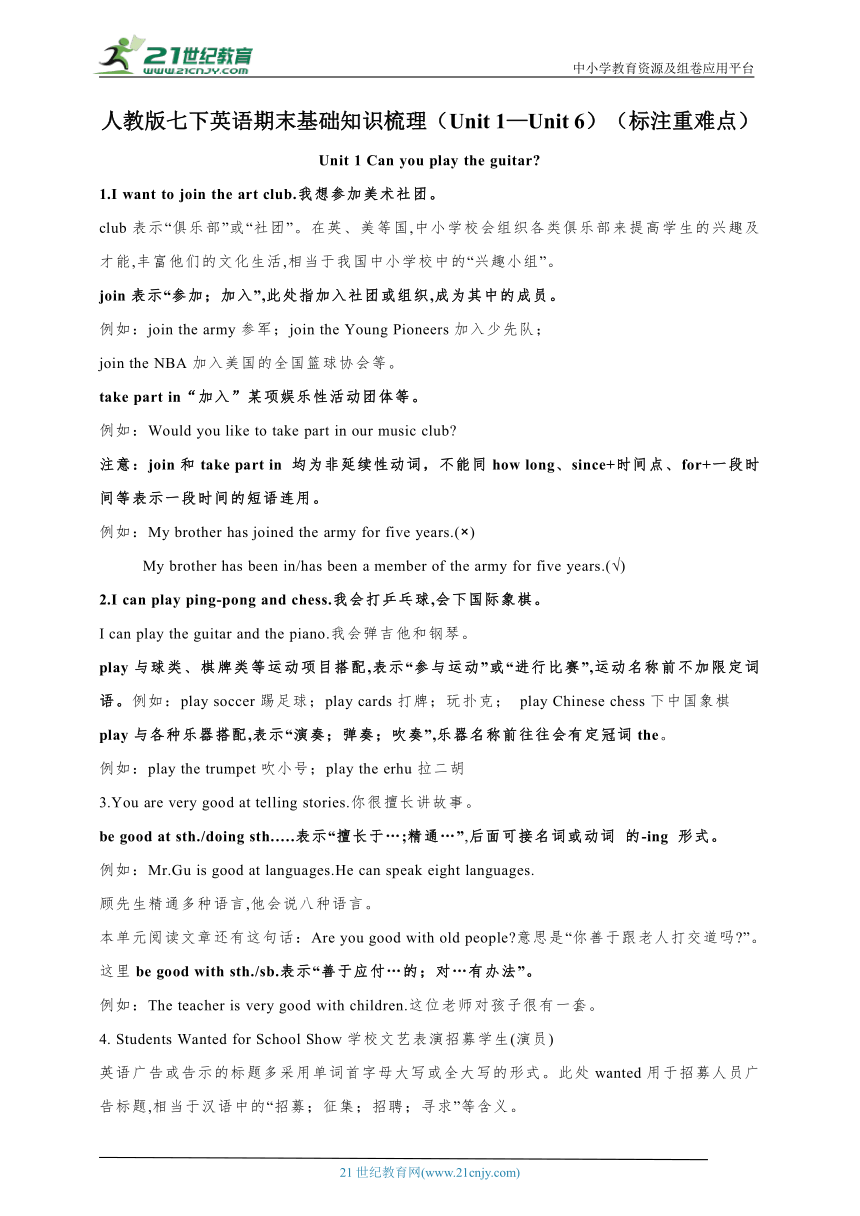 | |
| 格式 | docx | ||
| 文件大小 | 305.6KB | ||
| 资源类型 | 试卷 | ||
| 版本资源 | 人教新目标(Go for it)版 | ||
| 科目 | 英语 | ||
| 更新时间 | 2024-06-02 12:33:45 | ||
图片预览

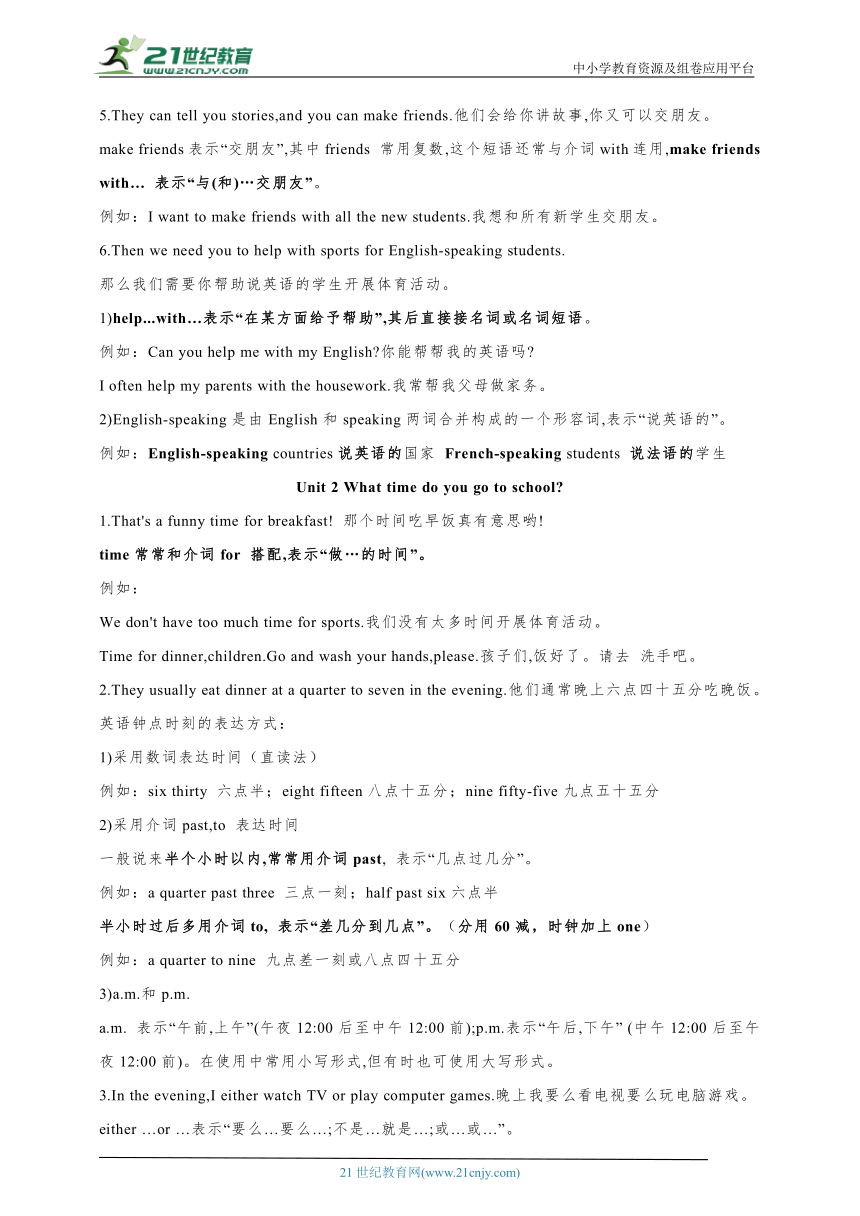
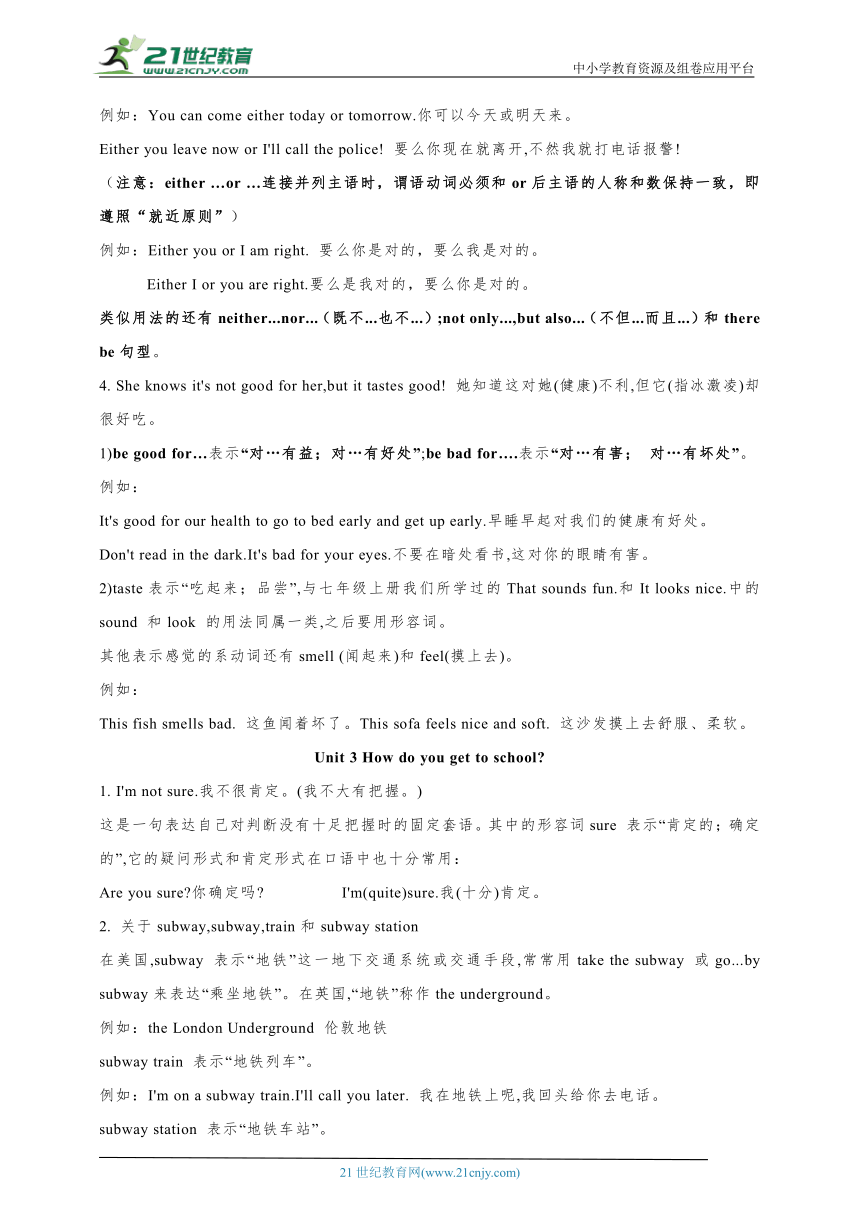
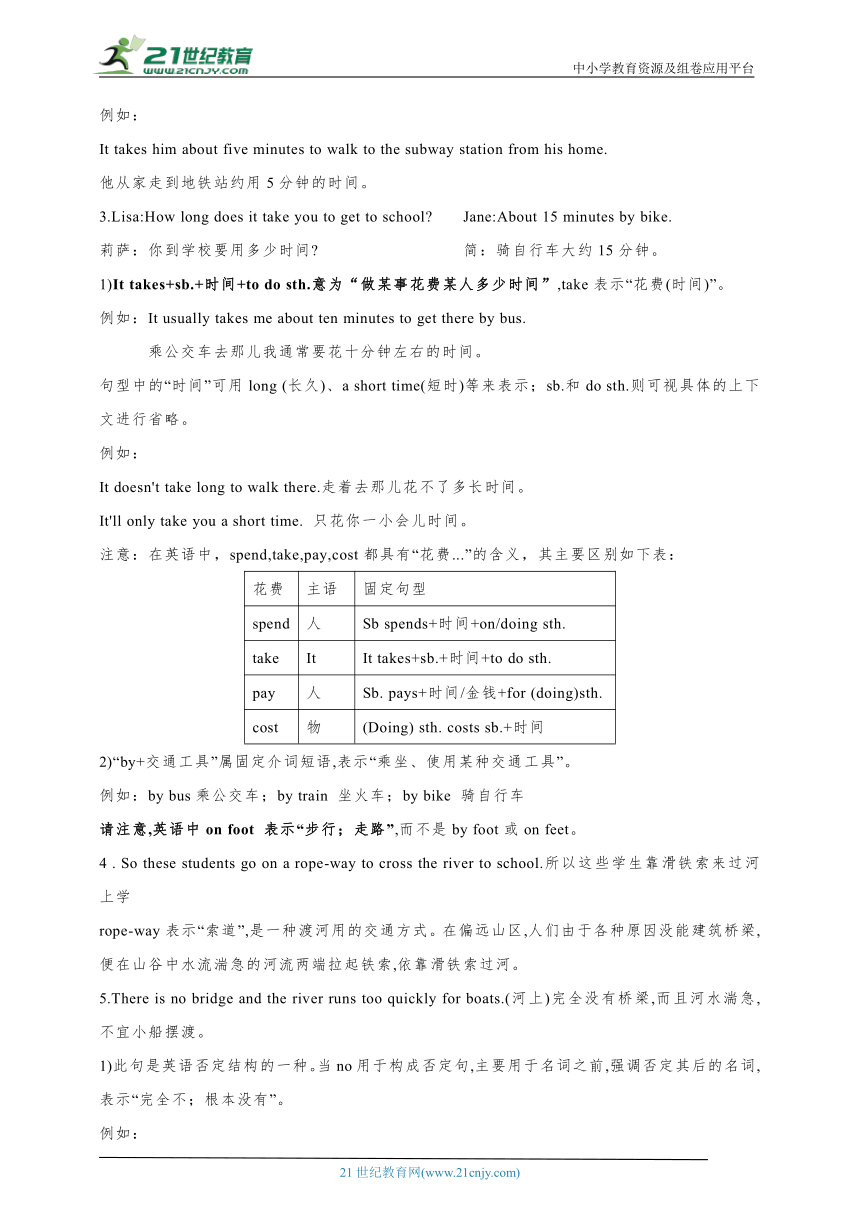
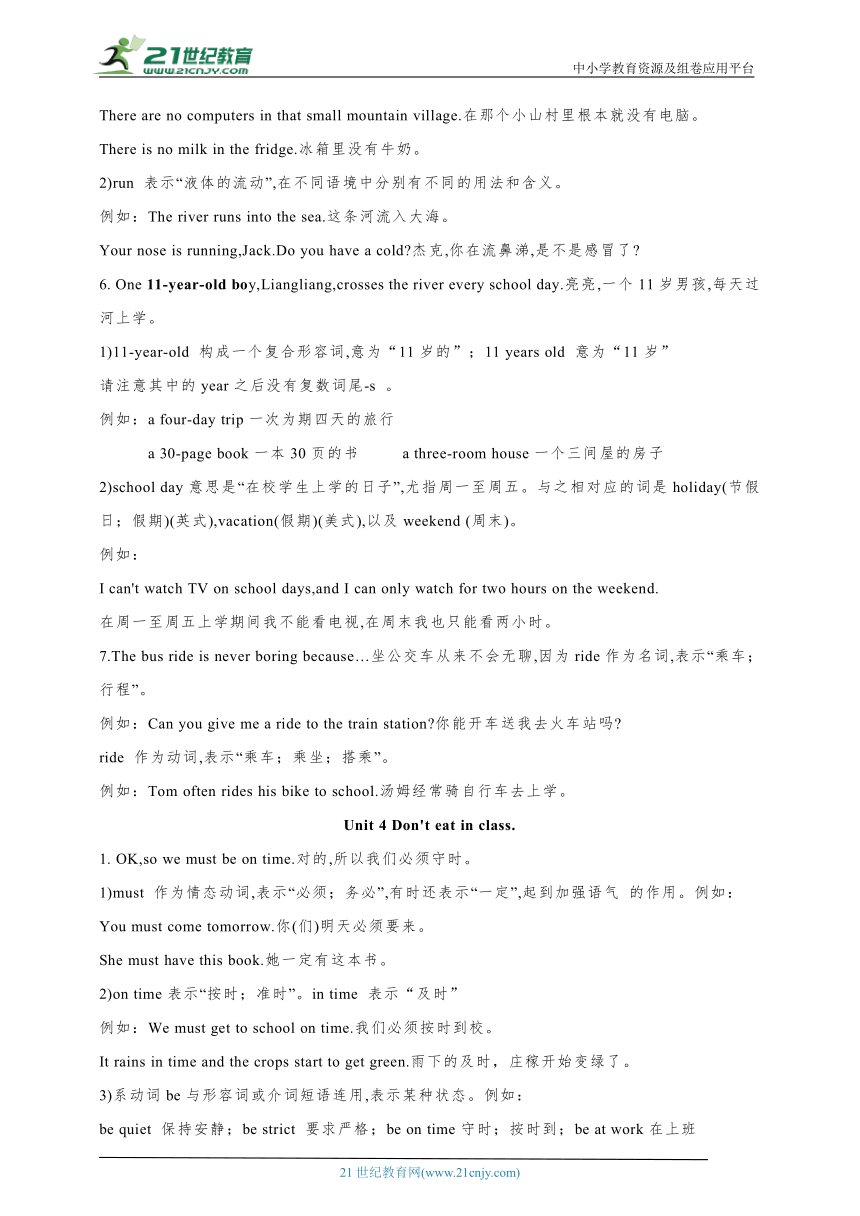
文档简介
中小学教育资源及组卷应用平台
人教版七下英语期末基础知识梳理(Unit 1—Unit 6)(标注重难点)
Unit 1 Can you play the guitar
1.I want to join the art club.我想参加美术社团。
club表示“俱乐部”或“社团”。在英、美等国,中小学校会组织各类俱乐部来提高学生的兴趣及才能,丰富他们的文化生活,相当于我国中小学校中的“兴趣小组”。
join表示“参加;加入”,此处指加入社团或组织,成为其中的成员。
例如:join the army参军;join the Young Pioneers加入少先队;
join the NBA加入美国的全国篮球协会等。
take part in“加入”某项娱乐性活动团体等。
例如:Would you like to take part in our music club
注意:join和take part in 均为非延续性动词,不能同how long、since+时间点、for+一段时间等表示一段时间的短语连用。
例如:My brother has joined the army for five years.(×)
My brother has been in/has been a member of the army for five years.(√)
2.I can play ping-pong and chess.我会打乒乓球,会下国际象棋。
I can play the guitar and the piano.我会弹吉他和钢琴。
play与球类、棋牌类等运动项目搭配,表示“参与运动”或“进行比赛”,运动名称前不加限定词语。例如:play soccer踢足球;play cards打牌;玩扑克; play Chinese chess下中国象棋
play与各种乐器搭配,表示“演奏;弹奏;吹奏”,乐器名称前往往会有定冠词the。
例如:play the trumpet吹小号;play the erhu拉二胡
3.You are very good at telling stories.你很擅长讲故事。
be good at sth./doing sth.….表示“擅长于…;精通…”,后面可接名词或动词 的-ing 形式。
例如:Mr.Gu is good at languages.He can speak eight languages.
顾先生精通多种语言,他会说八种语言。
本单元阅读文章还有这句话:Are you good with old people 意思是“你善于跟老人打交道吗 ”。这里be good with sth./sb.表示“善于应付…的;对…有办法”。
例如:The teacher is very good with children.这位老师对孩子很有一套。
4. Students Wanted for School Show学校文艺表演招募学生(演员)
英语广告或告示的标题多采用单词首字母大写或全大写的形式。此处wanted用于招募人员广告标题,相当于汉语中的“招募;征集;招聘;寻求”等含义。
5.They can tell you stories,and you can make friends.他们会给你讲故事,你又可以交朋友。
make friends表示“交朋友”,其中friends 常用复数,这个短语还常与介词with连用,make friends with… 表示“与(和)…交朋友”。
例如:I want to make friends with all the new students.我想和所有新学生交朋友。
6.Then we need you to help with sports for English-speaking students.
那么我们需要你帮助说英语的学生开展体育活动。
1)help...with…表示“在某方面给予帮助”,其后直接接名词或名词短语。
例如:Can you help me with my English 你能帮帮我的英语吗
I often help my parents with the housework.我常帮我父母做家务。
2)English-speaking是由English和speaking两词合并构成的一个形容词,表示“说英语的”。
例如:English-speaking countries说英语的国家 French-speaking students 说法语的学生
Unit 2 What time do you go to school
1.That's a funny time for breakfast! 那个时间吃早饭真有意思哟!
time常常和介词for 搭配,表示“做…的时间”。
例如:
We don't have too much time for sports.我们没有太多时间开展体育活动。
Time for dinner,children.Go and wash your hands,please.孩子们,饭好了。请去 洗手吧。
2.They usually eat dinner at a quarter to seven in the evening.他们通常晚上六点四十五分吃晚饭。
英语钟点时刻的表达方式:
1)采用数词表达时间(直读法)
例如:six thirty 六点半;eight fifteen八点十五分;nine fifty-five九点五十五分
2)采用介词past,to 表达时间
一般说来半个小时以内,常常用介词past, 表示“几点过几分”。
例如:a quarter past three 三点一刻;half past six六点半
半小时过后多用介词to, 表示“差几分到几点”。(分用60减,时钟加上one)
例如:a quarter to nine 九点差一刻或八点四十五分
3)a.m.和p.m.
a.m. 表示“午前,上午”(午夜12:00后至中午12:00前);p.m.表示“午后,下午” (中午12:00后至午夜12:00前)。在使用中常用小写形式,但有时也可使用大写形式。
3.In the evening,I either watch TV or play computer games.晚上我要么看电视要么玩电脑游戏。
either …or …表示“要么…要么…;不是…就是…;或…或…”。
例如:You can come either today or tomorrow.你可以今天或明天来。
Either you leave now or I'll call the police! 要么你现在就离开,不然我就打电话报警!
(注意:either …or …连接并列主语时,谓语动词必须和or后主语的人称和数保持一致,即遵照“就近原则”)
例如:Either you or I am right. 要么你是对的,要么我是对的。
Either I or you are right.要么是我对的,要么你是对的。
类似用法的还有neither...nor...(既不...也不...);not only...,but also...(不但...而且...)和there be句型。
4. She knows it's not good for her,but it tastes good! 她知道这对她(健康)不利,但它(指冰激凌)却很好吃。
1)be good for…表示“对…有益;对…有好处”;be bad for….表示“对…有害; 对…有坏处”。
例如:
It's good for our health to go to bed early and get up early.早睡早起对我们的健康有好处。
Don't read in the dark.It's bad for your eyes.不要在暗处看书,这对你的眼睛有害。
2)taste表示“吃起来;品尝”,与七年级上册我们所学过的That sounds fun.和It looks nice.中的sound 和look 的用法同属一类,之后要用形容词。
其他表示感觉的系动词还有smell (闻起来)和feel(摸上去)。
例如:
This fish smells bad. 这鱼闻着坏了。This sofa feels nice and soft. 这沙发摸上去舒服、柔软。
Unit 3 How do you get to school
1. I'm not sure.我不很肯定。(我不大有把握。)
这是一句表达自己对判断没有十足把握时的固定套语。其中的形容词sure 表示“肯定的;确定的”,它的疑问形式和肯定形式在口语中也十分常用:
Are you sure 你确定吗 I'm(quite)sure.我(十分)肯定。
2. 关于subway,subway,train和subway station
在美国,subway 表示“地铁”这一地下交通系统或交通手段,常常用take the subway 或go...by subway来表达“乘坐地铁”。在英国,“地铁”称作the underground。
例如:the London Underground 伦敦地铁
subway train 表示“地铁列车”。
例如:I'm on a subway train.I'll call you later. 我在地铁上呢,我回头给你去电话。
subway station 表示“地铁车站”。
例如:
It takes him about five minutes to walk to the subway station from his home.
他从家走到地铁站约用5分钟的时间。
3.Lisa:How long does it take you to get to school Jane:About 15 minutes by bike.
莉萨:你到学校要用多少时间 简:骑自行车大约15分钟。
1)It takes+sb.+时间+to do sth.意为“做某事花费某人多少时间”,take表示“花费(时间)”。
例如:It usually takes me about ten minutes to get there by bus.
乘公交车去那儿我通常要花十分钟左右的时间。
句型中的“时间”可用long (长久)、a short time(短时)等来表示;sb.和do sth.则可视具体的上下文进行省略。
例如:
It doesn't take long to walk there.走着去那儿花不了多长时间。
It'll only take you a short time. 只花你一小会儿时间。
注意:在英语中,spend,take,pay,cost都具有“花费...”的含义,其主要区别如下表:
花费 主语 固定句型
spend 人 Sb spends+时间+on/doing sth.
take It It takes+sb.+时间+to do sth.
pay 人 Sb. pays+时间/金钱+for (doing)sth.
cost 物 (Doing) sth. costs sb.+时间
2)“by+交通工具”属固定介词短语,表示“乘坐、使用某种交通工具”。
例如:by bus乘公交车;by train 坐火车;by bike 骑自行车
请注意,英语中on foot 表示“步行;走路”,而不是by foot或on feet。
4 . So these students go on a rope-way to cross the river to school.所以这些学生靠滑铁索来过河上学
rope-way表示“索道”,是一种渡河用的交通方式。在偏远山区,人们由于各种原因没能建筑桥梁,便在山谷中水流湍急的河流两端拉起铁索,依靠滑铁索过河。
5.There is no bridge and the river runs too quickly for boats.(河上)完全没有桥梁,而且河水湍急,不宜小船摆渡。
1)此句是英语否定结构的一种。当no用于构成否定句,主要用于名词之前,强调否定其后的名词,表示“完全不;根本没有”。
例如:
There are no computers in that small mountain village.在那个小山村里根本就没有电脑。
There is no milk in the fridge.冰箱里没有牛奶。
2)run 表示“液体的流动”,在不同语境中分别有不同的用法和含义。
例如:The river runs into the sea.这条河流入大海。
Your nose is running,Jack.Do you have a cold 杰克,你在流鼻涕,是不是感冒了
6. One 11-year-old boy,Liangliang,crosses the river every school day.亮亮,一个11岁男孩,每天过河上学。
1)11-year-old 构成一个复合形容词,意为“11岁的”;11 years old 意为“11岁”
请注意其中的year之后没有复数词尾-s 。
例如:a four-day trip一次为期四天的旅行
a 30-page book一本30页的书 a three-room house一个三间屋的房子
2)school day意思是“在校学生上学的日子”,尤指周一至周五。与之相对应的词是holiday(节假日;假期)(英式),vacation(假期)(美式),以及weekend (周末)。
例如:
I can't watch TV on school days,and I can only watch for two hours on the weekend.
在周一至周五上学期间我不能看电视,在周末我也只能看两小时。
7.The bus ride is never boring because…坐公交车从来不会无聊,因为ride作为名词,表示“乘车;行程”。
例如:Can you give me a ride to the train station 你能开车送我去火车站吗
ride 作为动词,表示“乘车;乘坐;搭乘”。
例如:Tom often rides his bike to school.汤姆经常骑自行车去上学。
Unit 4 Don't eat in class.
1. OK,so we must be on time.对的,所以我们必须守时。
1)must 作为情态动词,表示“必须;务必”,有时还表示“一定”,起到加强语气 的作用。例如:
You must come tomorrow.你(们)明天必须要来。
She must have this book.她一定有这本书。
2)on time表示“按时;准时”。in time 表示“及时”
例如:We must get to school on time.我们必须按时到校。
It rains in time and the crops start to get green.雨下的及时,庄稼开始变绿了。
3)系动词be与形容词或介词短语连用,表示某种状态。例如:
be quiet 保持安静;be strict 要求严格;be on time守时;按时到;be at work在上班
You mustn't be noisy,children. 孩子们,你们一定不可喧闹。
At this time of the day children are at school.一天中的这个时候,孩子们在学校上课呢。
2. Dear Dr.Know 亲爱的知心博士/医生
Dr.为doctor (博士;医生;医师)一词的缩写形式,冠于姓氏之前。
Dr.采用的是首尾缩写法,取词首字母和词尾字母将单词进行缩写。
3. Don't leave the dirty dishes in the kitchen! 别把脏碗留在厨房里!
leave作为动词,表示“留下;剩下”。例如:
Please leave the book on your desk.请把书留在你们的课桌上。
4.After dinner,I can't relax either.晚饭后我也不能放松。
副词either表示“也不”,用于否定句句末,用法与too 相似,可用逗号与语句的主题隔开。
例如:
You like English.I like it,too.你喜欢英语,我也喜欢。
My father can't speak English.My mother can't (speak it),either.
我爸爸不会讲英语,我妈妈也不会。
Unit 5 Why do you like pandas
1. WELCOME TO THE ZOO 欢迎光临动物园
这是一块大型宣传广告牌,此处采用了全大写的形式。全大写是英语广告宣传、报刊书籍大字标题常运用的一种手段。
Welcome to …表示“欢迎来某处”。例如:
Welcome to Beijing!北京欢迎您!(欢迎来北京!)
Welcome to our school! 欢迎光临我校!
2.Because they are kind of interesting. 因为它们有点趣味。
kind of+形容词/副词,意思是“稍微;有点儿”。
如:I don't like this story.It's kind of boring.我不喜欢这个故事,它有点无聊。
kind 还有一个比较常见的意义,就是“种类”。如:all kinds of music.各种类型的音乐。
3. He can walk on two legs.他(指“狗”)会用两条腿走路。(他会立着行走。)
walk on …表示“用某种方式行走”。例如:
walk on one's hands表示“用手倒立行走”
walk on one's knees表示“跪着走;跪着向前挪动”
The children like to walk around the house on their hands and knees.
孩子们喜欢手脚并用在房子里爬来爬去。
4. People say that“an elephant never forgets”.人们说“大象从来不会忘记”。
大象的记忆力出众,我们人类望尘莫及。因此大凡说到记忆力,英美人士往往用大象来进行比喻。
例如:Jack never forgets anything.He has a memory like an elephant.
杰克从来不忘事,他的记忆力好得惊人。(杰克从来不忘事,他的记忆力像大象一样好。)
5.Elephants can walk for a long time and never get lost.大象能够长时间行走而且从不迷路。
1)lost 作为形容词,表示“走失的;迷路的;失散的”,“丢失的;遗失的”,常与系动词get或be一同构成短语,表示“丢失;走失;迷路”。
例如:What bad luck!My keys are lost again.真是倒霉!我的钥匙又丢了。
I got lost on my way here and had to ask the police for help.
我来这儿的路上迷了 路,不得不找警察帮忙。
2)lost 还经常直接用于名词之前,作定语修饰名词。例如:
a lost child 走丢了的孩子 the lost tourists 迷了路的游客们 a lost watch 被人遗失的手表
6.But elephants are in great danger.但是大象面临巨大的危险。
(be)in danger表示“面临危险”。例如:
Fire fighters are often in great danger.消防员常常处于很危险的境地。
英语中,常用形容词big 或great与danger 搭配,表示“巨大的危险”。(be) out of danger,表示“脱离危险”。
例如:The doctors say he's now out of danger.大夫们说现在他脱离了危险。
7.有关3,000和100,000的读法
3,000读作three thousand,thousand是“千”的意思。
英语中没有单独的词汇表达“万”的概念,必须通过thousand 转换表述。
例如:100,000则只能使用thousand, 读作:one hundred thousand。
注意:hundred、thousand、million和billion的用法
前面为基数词 无复数形式 7 hundred,100 thousand,83 million,105billion
与of连用 必须用复数形式 hundreds of,thousands of,millions of和billions of
8.We must save the trees and not buy things made of ivory.我们必须拯救树木,拒买象牙制品。
made of.….表示“由…制作(制造)”。
例如:made of wood由木头制成;made of glass由玻璃制作
当made of… 作定语限定修饰名词时,必须放在该名词之后。语法将其称作“后置定语”。
例如:a boat made of paper一条纸叠的小船things made of bamboo竹制品;竹子做的东西
Unit 6 I'm watching TV.
1.Jenny:What are you doing Laura:Not much.
珍妮:你在干什么呢 (你忙什么呢 ) 劳拉:没忙什么。
Not much是用做回答的交际套语,还可说成Nothing much,相当于汉语“不忙什么;没什么事”,表示自己有空。
例如:A:What are you doing this evening 你今晚要做什么事 B:Well,nothing much.嗯,没什么事。
2.Do you want to join me for dinner 你想跟我一起吃个饭吗
join somebody for something表示“与某人一起做某事;参与或加入到某人的行列中一起做某事”。
例如:Would you come and join us for a cup of coffee We need to talk to you.
你来跟我们喝杯咖啡好吗 我们有事要跟你谈。
3. I'd love to.我很乐意。
1)I'd love to是I would love to的缩略形式。I'd love to经常用于礼貌地接受他人邀请,还可说成I'd like to, 但语气较前者稍弱。
例如:
A:Would you like to come with us to the show 你愿意跟我们一起去看表演吗
B:Thanks.I'd like to. 多谢了,我可以的。
2)当婉言拒绝他人邀请时,英语多用I'd love to,but …或Sorry,I'm afraid I can't because …等。
例如:
A:I'm going to town.Would you like to join me 我进城去,你想跟我一同去吗
B:Sorry,I'm afraid I can't because I still have lots of homework to do.
真抱歉,怕是不成了,我还有好多作业要做呢。
4. His dad and uncle are watching the boat races on TV.他爸爸和叔叔正在看电视上的龙舟比赛。
race用于体育话题时,主要指赛跑、赛车、游泳等与速度相关的“比赛”;而game 则多指球类、棋类等体育“比赛”。例如:
Do you like to watch NBA games on TV 你喜欢看电视上的美国NBA篮球赛吗
He's the youngest swimmer in the race.他是比赛中最年轻的游泳选手。
5.….so it's like any other night for Zhu Hui and his host family.所以对朱辉和他 的房东家人来说,今晚和平时的晚上是一样的。
1)any other night表示“任何(一个)其他的夜晚”。其中any 表示“任何一个;任意一个”。
例如:
A:When can I come 我什么时候能来
B:Any day from today.从今天开始任何一天都可以。
注意:any other …表示“任何别的…;任何其他的…”。常用形容词和副词的最高级和比较级的同义互换中。
例如:She sing best in her glass.=She sings better than any other student in her class.
The Yangze River is the longest river in China.
=The Yangze River is longer than any other river in China.
2)host family指人们出国时所借宿的人家,类似汉语中“房东家”。
例如:
Do you want to learn to speak English well Why not go to England and stay with a host family
你想学说一口好的英语吗 为什么不去英国与房东一家人住在一起呢
6.…but there's.still“no place like home". 但是“千好万好还是不如自己的家好”。 (金窝银窝不如自己的狗窝。)
这是一个谚语,源自1823年英国伦敦首演的一部音乐剧中一首名为《家,甜蜜的家》 (Home,Sweet Home) 的歌曲。后来这首歌很快走红,其中的歌词… there's no place like home 被人们广为使用,成为独立的谚语。
英语中还有一句类似的谚语:East or west,home is best.
21世纪教育网 www.21cnjy.com 精品试卷·第 2 页 (共 2 页)
21世纪教育网(www.21cnjy.com)
人教版七下英语期末基础知识梳理(Unit 1—Unit 6)(标注重难点)
Unit 1 Can you play the guitar
1.I want to join the art club.我想参加美术社团。
club表示“俱乐部”或“社团”。在英、美等国,中小学校会组织各类俱乐部来提高学生的兴趣及才能,丰富他们的文化生活,相当于我国中小学校中的“兴趣小组”。
join表示“参加;加入”,此处指加入社团或组织,成为其中的成员。
例如:join the army参军;join the Young Pioneers加入少先队;
join the NBA加入美国的全国篮球协会等。
take part in“加入”某项娱乐性活动团体等。
例如:Would you like to take part in our music club
注意:join和take part in 均为非延续性动词,不能同how long、since+时间点、for+一段时间等表示一段时间的短语连用。
例如:My brother has joined the army for five years.(×)
My brother has been in/has been a member of the army for five years.(√)
2.I can play ping-pong and chess.我会打乒乓球,会下国际象棋。
I can play the guitar and the piano.我会弹吉他和钢琴。
play与球类、棋牌类等运动项目搭配,表示“参与运动”或“进行比赛”,运动名称前不加限定词语。例如:play soccer踢足球;play cards打牌;玩扑克; play Chinese chess下中国象棋
play与各种乐器搭配,表示“演奏;弹奏;吹奏”,乐器名称前往往会有定冠词the。
例如:play the trumpet吹小号;play the erhu拉二胡
3.You are very good at telling stories.你很擅长讲故事。
be good at sth./doing sth.….表示“擅长于…;精通…”,后面可接名词或动词 的-ing 形式。
例如:Mr.Gu is good at languages.He can speak eight languages.
顾先生精通多种语言,他会说八种语言。
本单元阅读文章还有这句话:Are you good with old people 意思是“你善于跟老人打交道吗 ”。这里be good with sth./sb.表示“善于应付…的;对…有办法”。
例如:The teacher is very good with children.这位老师对孩子很有一套。
4. Students Wanted for School Show学校文艺表演招募学生(演员)
英语广告或告示的标题多采用单词首字母大写或全大写的形式。此处wanted用于招募人员广告标题,相当于汉语中的“招募;征集;招聘;寻求”等含义。
5.They can tell you stories,and you can make friends.他们会给你讲故事,你又可以交朋友。
make friends表示“交朋友”,其中friends 常用复数,这个短语还常与介词with连用,make friends with… 表示“与(和)…交朋友”。
例如:I want to make friends with all the new students.我想和所有新学生交朋友。
6.Then we need you to help with sports for English-speaking students.
那么我们需要你帮助说英语的学生开展体育活动。
1)help...with…表示“在某方面给予帮助”,其后直接接名词或名词短语。
例如:Can you help me with my English 你能帮帮我的英语吗
I often help my parents with the housework.我常帮我父母做家务。
2)English-speaking是由English和speaking两词合并构成的一个形容词,表示“说英语的”。
例如:English-speaking countries说英语的国家 French-speaking students 说法语的学生
Unit 2 What time do you go to school
1.That's a funny time for breakfast! 那个时间吃早饭真有意思哟!
time常常和介词for 搭配,表示“做…的时间”。
例如:
We don't have too much time for sports.我们没有太多时间开展体育活动。
Time for dinner,children.Go and wash your hands,please.孩子们,饭好了。请去 洗手吧。
2.They usually eat dinner at a quarter to seven in the evening.他们通常晚上六点四十五分吃晚饭。
英语钟点时刻的表达方式:
1)采用数词表达时间(直读法)
例如:six thirty 六点半;eight fifteen八点十五分;nine fifty-five九点五十五分
2)采用介词past,to 表达时间
一般说来半个小时以内,常常用介词past, 表示“几点过几分”。
例如:a quarter past three 三点一刻;half past six六点半
半小时过后多用介词to, 表示“差几分到几点”。(分用60减,时钟加上one)
例如:a quarter to nine 九点差一刻或八点四十五分
3)a.m.和p.m.
a.m. 表示“午前,上午”(午夜12:00后至中午12:00前);p.m.表示“午后,下午” (中午12:00后至午夜12:00前)。在使用中常用小写形式,但有时也可使用大写形式。
3.In the evening,I either watch TV or play computer games.晚上我要么看电视要么玩电脑游戏。
either …or …表示“要么…要么…;不是…就是…;或…或…”。
例如:You can come either today or tomorrow.你可以今天或明天来。
Either you leave now or I'll call the police! 要么你现在就离开,不然我就打电话报警!
(注意:either …or …连接并列主语时,谓语动词必须和or后主语的人称和数保持一致,即遵照“就近原则”)
例如:Either you or I am right. 要么你是对的,要么我是对的。
Either I or you are right.要么是我对的,要么你是对的。
类似用法的还有neither...nor...(既不...也不...);not only...,but also...(不但...而且...)和there be句型。
4. She knows it's not good for her,but it tastes good! 她知道这对她(健康)不利,但它(指冰激凌)却很好吃。
1)be good for…表示“对…有益;对…有好处”;be bad for….表示“对…有害; 对…有坏处”。
例如:
It's good for our health to go to bed early and get up early.早睡早起对我们的健康有好处。
Don't read in the dark.It's bad for your eyes.不要在暗处看书,这对你的眼睛有害。
2)taste表示“吃起来;品尝”,与七年级上册我们所学过的That sounds fun.和It looks nice.中的sound 和look 的用法同属一类,之后要用形容词。
其他表示感觉的系动词还有smell (闻起来)和feel(摸上去)。
例如:
This fish smells bad. 这鱼闻着坏了。This sofa feels nice and soft. 这沙发摸上去舒服、柔软。
Unit 3 How do you get to school
1. I'm not sure.我不很肯定。(我不大有把握。)
这是一句表达自己对判断没有十足把握时的固定套语。其中的形容词sure 表示“肯定的;确定的”,它的疑问形式和肯定形式在口语中也十分常用:
Are you sure 你确定吗 I'm(quite)sure.我(十分)肯定。
2. 关于subway,subway,train和subway station
在美国,subway 表示“地铁”这一地下交通系统或交通手段,常常用take the subway 或go...by subway来表达“乘坐地铁”。在英国,“地铁”称作the underground。
例如:the London Underground 伦敦地铁
subway train 表示“地铁列车”。
例如:I'm on a subway train.I'll call you later. 我在地铁上呢,我回头给你去电话。
subway station 表示“地铁车站”。
例如:
It takes him about five minutes to walk to the subway station from his home.
他从家走到地铁站约用5分钟的时间。
3.Lisa:How long does it take you to get to school Jane:About 15 minutes by bike.
莉萨:你到学校要用多少时间 简:骑自行车大约15分钟。
1)It takes+sb.+时间+to do sth.意为“做某事花费某人多少时间”,take表示“花费(时间)”。
例如:It usually takes me about ten minutes to get there by bus.
乘公交车去那儿我通常要花十分钟左右的时间。
句型中的“时间”可用long (长久)、a short time(短时)等来表示;sb.和do sth.则可视具体的上下文进行省略。
例如:
It doesn't take long to walk there.走着去那儿花不了多长时间。
It'll only take you a short time. 只花你一小会儿时间。
注意:在英语中,spend,take,pay,cost都具有“花费...”的含义,其主要区别如下表:
花费 主语 固定句型
spend 人 Sb spends+时间+on/doing sth.
take It It takes+sb.+时间+to do sth.
pay 人 Sb. pays+时间/金钱+for (doing)sth.
cost 物 (Doing) sth. costs sb.+时间
2)“by+交通工具”属固定介词短语,表示“乘坐、使用某种交通工具”。
例如:by bus乘公交车;by train 坐火车;by bike 骑自行车
请注意,英语中on foot 表示“步行;走路”,而不是by foot或on feet。
4 . So these students go on a rope-way to cross the river to school.所以这些学生靠滑铁索来过河上学
rope-way表示“索道”,是一种渡河用的交通方式。在偏远山区,人们由于各种原因没能建筑桥梁,便在山谷中水流湍急的河流两端拉起铁索,依靠滑铁索过河。
5.There is no bridge and the river runs too quickly for boats.(河上)完全没有桥梁,而且河水湍急,不宜小船摆渡。
1)此句是英语否定结构的一种。当no用于构成否定句,主要用于名词之前,强调否定其后的名词,表示“完全不;根本没有”。
例如:
There are no computers in that small mountain village.在那个小山村里根本就没有电脑。
There is no milk in the fridge.冰箱里没有牛奶。
2)run 表示“液体的流动”,在不同语境中分别有不同的用法和含义。
例如:The river runs into the sea.这条河流入大海。
Your nose is running,Jack.Do you have a cold 杰克,你在流鼻涕,是不是感冒了
6. One 11-year-old boy,Liangliang,crosses the river every school day.亮亮,一个11岁男孩,每天过河上学。
1)11-year-old 构成一个复合形容词,意为“11岁的”;11 years old 意为“11岁”
请注意其中的year之后没有复数词尾-s 。
例如:a four-day trip一次为期四天的旅行
a 30-page book一本30页的书 a three-room house一个三间屋的房子
2)school day意思是“在校学生上学的日子”,尤指周一至周五。与之相对应的词是holiday(节假日;假期)(英式),vacation(假期)(美式),以及weekend (周末)。
例如:
I can't watch TV on school days,and I can only watch for two hours on the weekend.
在周一至周五上学期间我不能看电视,在周末我也只能看两小时。
7.The bus ride is never boring because…坐公交车从来不会无聊,因为ride作为名词,表示“乘车;行程”。
例如:Can you give me a ride to the train station 你能开车送我去火车站吗
ride 作为动词,表示“乘车;乘坐;搭乘”。
例如:Tom often rides his bike to school.汤姆经常骑自行车去上学。
Unit 4 Don't eat in class.
1. OK,so we must be on time.对的,所以我们必须守时。
1)must 作为情态动词,表示“必须;务必”,有时还表示“一定”,起到加强语气 的作用。例如:
You must come tomorrow.你(们)明天必须要来。
She must have this book.她一定有这本书。
2)on time表示“按时;准时”。in time 表示“及时”
例如:We must get to school on time.我们必须按时到校。
It rains in time and the crops start to get green.雨下的及时,庄稼开始变绿了。
3)系动词be与形容词或介词短语连用,表示某种状态。例如:
be quiet 保持安静;be strict 要求严格;be on time守时;按时到;be at work在上班
You mustn't be noisy,children. 孩子们,你们一定不可喧闹。
At this time of the day children are at school.一天中的这个时候,孩子们在学校上课呢。
2. Dear Dr.Know 亲爱的知心博士/医生
Dr.为doctor (博士;医生;医师)一词的缩写形式,冠于姓氏之前。
Dr.采用的是首尾缩写法,取词首字母和词尾字母将单词进行缩写。
3. Don't leave the dirty dishes in the kitchen! 别把脏碗留在厨房里!
leave作为动词,表示“留下;剩下”。例如:
Please leave the book on your desk.请把书留在你们的课桌上。
4.After dinner,I can't relax either.晚饭后我也不能放松。
副词either表示“也不”,用于否定句句末,用法与too 相似,可用逗号与语句的主题隔开。
例如:
You like English.I like it,too.你喜欢英语,我也喜欢。
My father can't speak English.My mother can't (speak it),either.
我爸爸不会讲英语,我妈妈也不会。
Unit 5 Why do you like pandas
1. WELCOME TO THE ZOO 欢迎光临动物园
这是一块大型宣传广告牌,此处采用了全大写的形式。全大写是英语广告宣传、报刊书籍大字标题常运用的一种手段。
Welcome to …表示“欢迎来某处”。例如:
Welcome to Beijing!北京欢迎您!(欢迎来北京!)
Welcome to our school! 欢迎光临我校!
2.Because they are kind of interesting. 因为它们有点趣味。
kind of+形容词/副词,意思是“稍微;有点儿”。
如:I don't like this story.It's kind of boring.我不喜欢这个故事,它有点无聊。
kind 还有一个比较常见的意义,就是“种类”。如:all kinds of music.各种类型的音乐。
3. He can walk on two legs.他(指“狗”)会用两条腿走路。(他会立着行走。)
walk on …表示“用某种方式行走”。例如:
walk on one's hands表示“用手倒立行走”
walk on one's knees表示“跪着走;跪着向前挪动”
The children like to walk around the house on their hands and knees.
孩子们喜欢手脚并用在房子里爬来爬去。
4. People say that“an elephant never forgets”.人们说“大象从来不会忘记”。
大象的记忆力出众,我们人类望尘莫及。因此大凡说到记忆力,英美人士往往用大象来进行比喻。
例如:Jack never forgets anything.He has a memory like an elephant.
杰克从来不忘事,他的记忆力好得惊人。(杰克从来不忘事,他的记忆力像大象一样好。)
5.Elephants can walk for a long time and never get lost.大象能够长时间行走而且从不迷路。
1)lost 作为形容词,表示“走失的;迷路的;失散的”,“丢失的;遗失的”,常与系动词get或be一同构成短语,表示“丢失;走失;迷路”。
例如:What bad luck!My keys are lost again.真是倒霉!我的钥匙又丢了。
I got lost on my way here and had to ask the police for help.
我来这儿的路上迷了 路,不得不找警察帮忙。
2)lost 还经常直接用于名词之前,作定语修饰名词。例如:
a lost child 走丢了的孩子 the lost tourists 迷了路的游客们 a lost watch 被人遗失的手表
6.But elephants are in great danger.但是大象面临巨大的危险。
(be)in danger表示“面临危险”。例如:
Fire fighters are often in great danger.消防员常常处于很危险的境地。
英语中,常用形容词big 或great与danger 搭配,表示“巨大的危险”。(be) out of danger,表示“脱离危险”。
例如:The doctors say he's now out of danger.大夫们说现在他脱离了危险。
7.有关3,000和100,000的读法
3,000读作three thousand,thousand是“千”的意思。
英语中没有单独的词汇表达“万”的概念,必须通过thousand 转换表述。
例如:100,000则只能使用thousand, 读作:one hundred thousand。
注意:hundred、thousand、million和billion的用法
前面为基数词 无复数形式 7 hundred,100 thousand,83 million,105billion
与of连用 必须用复数形式 hundreds of,thousands of,millions of和billions of
8.We must save the trees and not buy things made of ivory.我们必须拯救树木,拒买象牙制品。
made of.….表示“由…制作(制造)”。
例如:made of wood由木头制成;made of glass由玻璃制作
当made of… 作定语限定修饰名词时,必须放在该名词之后。语法将其称作“后置定语”。
例如:a boat made of paper一条纸叠的小船things made of bamboo竹制品;竹子做的东西
Unit 6 I'm watching TV.
1.Jenny:What are you doing Laura:Not much.
珍妮:你在干什么呢 (你忙什么呢 ) 劳拉:没忙什么。
Not much是用做回答的交际套语,还可说成Nothing much,相当于汉语“不忙什么;没什么事”,表示自己有空。
例如:A:What are you doing this evening 你今晚要做什么事 B:Well,nothing much.嗯,没什么事。
2.Do you want to join me for dinner 你想跟我一起吃个饭吗
join somebody for something表示“与某人一起做某事;参与或加入到某人的行列中一起做某事”。
例如:Would you come and join us for a cup of coffee We need to talk to you.
你来跟我们喝杯咖啡好吗 我们有事要跟你谈。
3. I'd love to.我很乐意。
1)I'd love to是I would love to的缩略形式。I'd love to经常用于礼貌地接受他人邀请,还可说成I'd like to, 但语气较前者稍弱。
例如:
A:Would you like to come with us to the show 你愿意跟我们一起去看表演吗
B:Thanks.I'd like to. 多谢了,我可以的。
2)当婉言拒绝他人邀请时,英语多用I'd love to,but …或Sorry,I'm afraid I can't because …等。
例如:
A:I'm going to town.Would you like to join me 我进城去,你想跟我一同去吗
B:Sorry,I'm afraid I can't because I still have lots of homework to do.
真抱歉,怕是不成了,我还有好多作业要做呢。
4. His dad and uncle are watching the boat races on TV.他爸爸和叔叔正在看电视上的龙舟比赛。
race用于体育话题时,主要指赛跑、赛车、游泳等与速度相关的“比赛”;而game 则多指球类、棋类等体育“比赛”。例如:
Do you like to watch NBA games on TV 你喜欢看电视上的美国NBA篮球赛吗
He's the youngest swimmer in the race.他是比赛中最年轻的游泳选手。
5.….so it's like any other night for Zhu Hui and his host family.所以对朱辉和他 的房东家人来说,今晚和平时的晚上是一样的。
1)any other night表示“任何(一个)其他的夜晚”。其中any 表示“任何一个;任意一个”。
例如:
A:When can I come 我什么时候能来
B:Any day from today.从今天开始任何一天都可以。
注意:any other …表示“任何别的…;任何其他的…”。常用形容词和副词的最高级和比较级的同义互换中。
例如:She sing best in her glass.=She sings better than any other student in her class.
The Yangze River is the longest river in China.
=The Yangze River is longer than any other river in China.
2)host family指人们出国时所借宿的人家,类似汉语中“房东家”。
例如:
Do you want to learn to speak English well Why not go to England and stay with a host family
你想学说一口好的英语吗 为什么不去英国与房东一家人住在一起呢
6.…but there's.still“no place like home". 但是“千好万好还是不如自己的家好”。 (金窝银窝不如自己的狗窝。)
这是一个谚语,源自1823年英国伦敦首演的一部音乐剧中一首名为《家,甜蜜的家》 (Home,Sweet Home) 的歌曲。后来这首歌很快走红,其中的歌词… there's no place like home 被人们广为使用,成为独立的谚语。
英语中还有一句类似的谚语:East or west,home is best.
21世纪教育网 www.21cnjy.com 精品试卷·第 2 页 (共 2 页)
21世纪教育网(www.21cnjy.com)
同课章节目录
